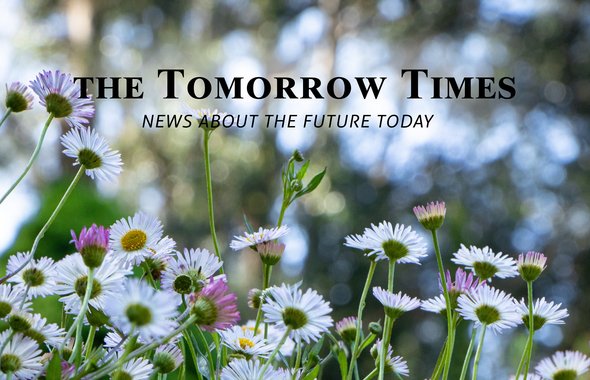
The Tomorrow Times - July '20
News > News about the future today
As summer unfolds, we begin to feel a positive impulse to live life with renewed meaning, to contribute to systemic changes, and to lay the foundations for more resilient systems for people and nature alike. In this edition of the Tomorrow Times, we focus on systemic design and regenerative solutions which truly integrate social, environmental, and economic resilience in the quest for a better future.
The pandemic sent the world a reminder on how planning for resilience proves critical to absorb stress, recover critical functionality, and thrive in altered circumstances. As our thoughts move towards recovery from the COVID-19 crisis, we are gifted with a great opportunity to create more resilient systems. The cornerstone of this endeavour is re-imaging our relationship with the natural world.
To do so, we need to encourage systemic changes, designing solutions where social, environmental, and economic aspects are intertwined, and driving collective actions that boost the adoption of local, circular economies. Only to give an idea of the huge untapped potential, circularity alone could address 45% of global greenhouse gas emissions and provide a $4.5 trillion economic opportunity.
Stay curious, keep up to date, and get inspired, all in a quick read.
Follow these periodical monthly updates of tomorrow’s sustainability news today, by subscribing to the Tomorrow Times.
Energy & Environment

- What can bananas teach us about COVID19? In 1950, the pathogen Foc-R1 brought the common banana to near extinction. Yet again, however, we missed the chance to learn a lesson about resilience, as nowadays a single variety represents 95% of all exported bananas. While society is struggling with the Corona pandemic, bananas are facing their own new fungus threat called Foc-TR4.
-
Lack of diversity, a recipe for failure. According to a recent article, a multi-decade subsidized tree planting program has instead accelerated biodiversity loss in Chile. This is because reforestation efforts often focused on one or two profitable tree species. Additionally, while forest area expanded by more than 100%, the carbon stored in vegetation increased by just 1.98%. Just another example of how the lack of diversity is an indicator of poor resilience systems.
- Sustainability ranked around the world. 32 indicators have been arranged into 11 issue categories and two policy objectives, ranking 180 countries’ Environmental Performance Index (EPI 2020) on environmental health and the vitality of their ecosystems. Full reports are available for download.
Business & Economy

- A guide to building a more resilient business. Although the current pandemic has shown how important it is to building resilient enterprises, few business schools teach resilience. Companies can structure their organizations and decision processes for resilience, by embracing the six principles of long-lasting systems published by Harvard Business Publishing.
- A new model of stakeholder capitalism: values above value. This pandemic crisis has proven companies with strong ESG credentials are far more resilient, as we’ve already seen increasing demand for companies to provide solutions, rather than simply selling products and services – Paul Polman wrote. It is important to remember that we already have a business plan, the sustainable development goals (SDGs) – worth at least $12trn (£11trn) a year, and 380 million jobs at a time when we need them most.
- Unilever strategy to tackle decarbonization. Unilever is releasing a new set of climate goals that makes it one of the most ambitious consumer goods company. Each of the company’s 70,000 products will show on their labels how much greenhouse gas was emitted in the process of manufacturing and shipping.
Science, Technology & Design

- Scientists’ warning: technological advancement is not enough. As wealth increases, so does consumption. This results in the reduction (or cancellation) of any gain brought about by technological change aimed at reducing environmental impact due to unbridled consumption. This is a clear example of the rebound effect. A new research shows the need for systemic solutions which address consumption at the root.
- Design by ‘Radical Indigenism’. The design field is at an inflection point. It must challenge its repertoire, rethink technology, and begin to see biodiversity as a building block of urban environments. First-ever compendium of indigenous technologies provides a powerful toolkit for climate-resilient design, rooted in indigenous knowledge.
- Big scale decarbonization with hydrogen is becoming a reality. Wärtsilä - the Finnish marine and energy engineering company - is developing 100% hydrogen fueled gas engines able to run on 100% hydrogen. The goal is the decarbonization of both power generation and shipping.
Urban Environment

- Mental resilience, a great tool in the pandemic time. ”Stress isn’t all bad, If you can cope today with all that’s happening in the world around you, then when you are on the other side of it, you’ll be stronger.” How we cope depends on what is in our resilience toolbox. Tools common to resilient people are optimism (that is also realistic), a moral compass, spiritual beliefs, cognitive and emotional flexibility, and social connectedness, says Steven M. Southwick – professor emeritus of psychiatry, PTSD and Resilience at Yale University and co-author of the book “Resilience: The Science of Mastering Life’s Greatest Challenges.
-
Empower the next generations towards resilient cities. The Energy Endeavour Foundation recently announced the SDE23 Call for Cities. Spread the word and encourage your city to become a Capital of Sustainability by hosting the Solar Decathlon Europe SDE23, a holistic urban design competition.
- Timber buildings: the future of sustainable constructions? Timber buildings are popping up around the world. Are they the solution to construction’s carbon problem? An interesting overview of the latest examples of how architects are embracing the material and finding innovative ways to use it.
Unexpected and Intriguing

- How improving soil health can help farmers. Farmers got an average of more than $3 back for every dollar invested in soil health, according to research by the American Farmland Trust.
- Why the Mediterranean is a climate change hotspot. MIT analysis uncovers the basis of the severe rainfall declines predicted by many models.
- A positive story during the lockdown. These are the World Economic Forum's Technology Pioneers of 2019. Cloud-connected home farms, vertical gardens in cities and much more.
Have you seen a news item suited for 'The Tomorrow Times'? Let us know and we'll consider including it in the next edition.
Previous Tomorrow Times editions
Find all Tomorrow Times editions and newsletters here.
Media & Downloads
Author
Luca Gennari
Environmental Engineering Consultant
 +31 10 7370215
+31 10 7370215


